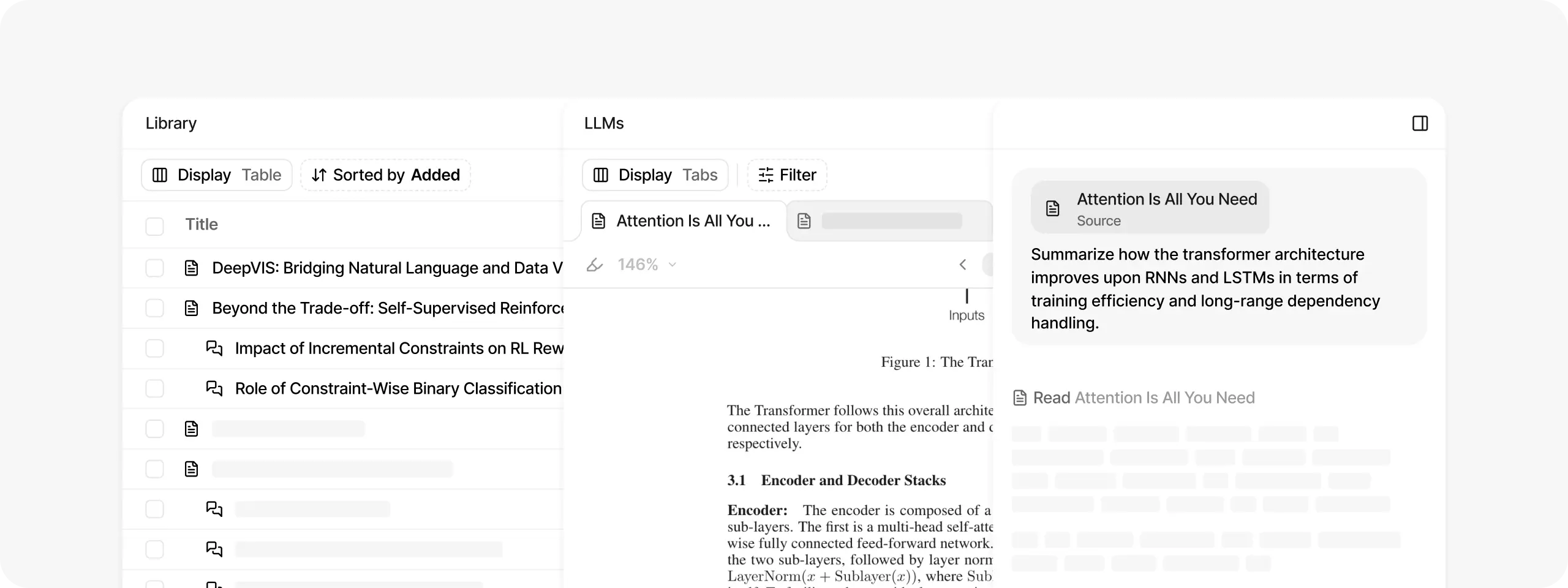How to Use AI for Literature Review? A Real 11-Step Guide
I recently interviewed a medical researcher who's been using our AI tool, Anara, for cancer navigation research in Africa. They went from drowning in papers to completing literature reviews in 4-5 days (what they described as a task that would normally "overwhelm me and cause significant delays").
I’m sharing their actual workflow and how they're using AI to crush literature reviews. No marketing speak, just practical steps from someone in the trenches.
Here's how they're using AI to do a systematic literature review:
1. Start with clear research questions
Before engaging with AI tools, define your research questions and topics clearly. My interviewee began by "listing all my literature review topics" before searching for papers. This focused approach helps the AI understand what information is most relevant to your work.
2. Gather relevant sources
Use traditional academic search engines like Google Scholar to identify potentially relevant papers. Don't worry about reading them all initially. As the researcher noted: "I find numerous papers, but there's simply no time to read them all."
3. Import sources into an AI research assistant
AI research tools like Anara allow you to import papers directly from links or PDFs. The researcher's workflow involved copying links from Google Scholar and importing them into Anara. This creates your personalized research library that the AI can analyze.
4. Ask targeted questions
Rather than attempting to read everything, ask specific questions about your sources. The researcher would "just type in 'what are the summary of these findings?'" and ask targeted questions like "What are the functions of cancer AI programs in Africa?" This approach helps surface relevant information quickly.
5. Use AI for initial screening
Let AI help you determine which papers deserve deeper reading. By getting summaries and answers to specific questions, you can identify which sources contain the most relevant information for your research objectives.
With Anara, I can quickly review abstracts, get summaries of papers, and receive suggestions about key findings, which significantly improves the quality of my work.
Medical rehabilitation researcher
6. Verify key information
While AI can extract and summarize information, critical research still requires verification. Use the "source highlighting" feature in literature review tools like Anara to see exactly where information comes from, allowing you to verify crucial points in the original source.
7. Maintain research continuity
Take advantage of persistent conversation history features. The researcher appreciated how Anara preserves research sessions: "I love that I can easily go back to my previous research sessions. The platform saves everything, so I don't have to search for information I've already found weeks ago." This helps build a coherent understanding across multiple research sessions.
8. Use AI for originality assistance
The researcher mentioned using AI to "give me suggestions of words that I can use instead of the words that are in the paper so that I don't copy the paper directly." This helps ensure your writing remains original while accurately representing the research.
9. Organize findings by research questions
Structure your AI interactions around your key research questions. This organization makes it easier to synthesize information later when writing your literature review.
10. Draft your review using AI-generated insights
When writing your literature review, use the insights gathered through AI to inform your structure and content. The researcher was able to complete writing "within just four or five days" that would normally have "overwhelmed me and caused significant delays."
11. Apply critical thinking
Remember that AI is a tool to augment your research capabilities, not replace critical thinking. Use it to process information more efficiently, but apply your expertise to evaluate the quality and relevance of findings.
By following this approach, you can significantly streamline your literature review process, saving valuable time while maintaining research quality. As the researcher noted, using AI has "significantly improved the quality of my work" by enabling more efficient processing of research literature.
Read our detailed case study if you want to see how all these steps come together in practice.
Have you tried using AI for lit reviews?
Sign up for Anara and get 1,000 AI words/day for free. See for yoursel if using AI for literature review improves your workflow. Join thousands of researchers who are cutting their review time in half while improving the quality of their work.
No credit card needed.
